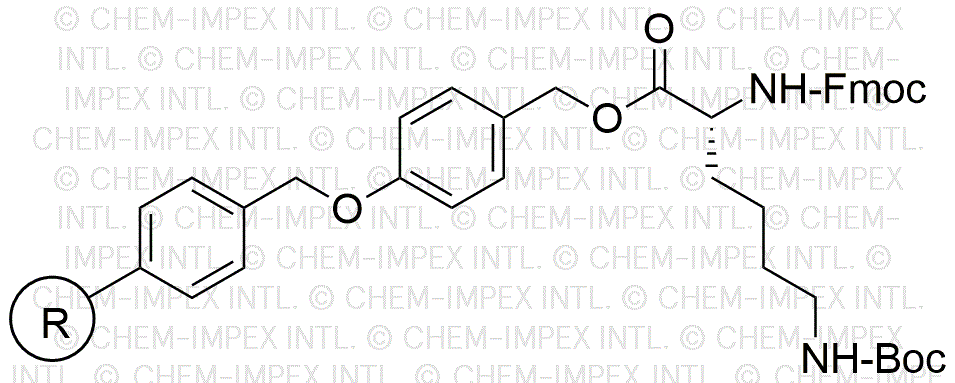Na-Fmoc-Ne-Boc-D-lysine 4-alkoxybenzyl alcohol resin is widely utilized in research focused on:
- Peptide Synthesis: This resin is essential for solid-phase peptide synthesis, allowing researchers to create complex peptides efficiently and with high purity.
- Drug Development: Its application in drug design facilitates the development of peptide-based therapeutics, which can lead to innovative treatments for various diseases.
- Bioconjugation: The resin serves as a versatile platform for attaching biomolecules, enhancing the specificity and efficacy of drug delivery systems.
- Research in Neuroscience: It aids in the synthesis of neuropeptides, which are crucial for studying neurological functions and disorders.
- Customizable Functionalization: The unique structure allows for tailored modifications, providing researchers with flexibility in designing experiments and optimizing results.
General Information
Properties
Safety and Regulations
Applications
Na-Fmoc-Ne-Boc-D-lysine 4-alkoxybenzyl alcohol resin is widely utilized in research focused on:
- Peptide Synthesis: This resin is essential for solid-phase peptide synthesis, allowing researchers to create complex peptides efficiently and with high purity.
- Drug Development: Its application in drug design facilitates the development of peptide-based therapeutics, which can lead to innovative treatments for various diseases.
- Bioconjugation: The resin serves as a versatile platform for attaching biomolecules, enhancing the specificity and efficacy of drug delivery systems.
- Research in Neuroscience: It aids in the synthesis of neuropeptides, which are crucial for studying neurological functions and disorders.
- Customizable Functionalization: The unique structure allows for tailored modifications, providing researchers with flexibility in designing experiments and optimizing results.
Documents
Safety Data Sheets (SDS)
The SDS provides comprehensive safety information on handling, storage, and disposal of the product.
Product Specification (PS)
The PS provides a comprehensive breakdown of the product’s properties, including chemical composition, physical state, purity, and storage requirements. It also details acceptable quality ranges and the product's intended applications.
Certificates of Analysis (COA)
Search for Certificates of Analysis (COA) by entering the products Lot Number. Lot and Batch Numbers can be found on a product’s label following the words ‘Lot’ or ‘Batch’.
Número de catálogo
Número de lote/lote
Certificates Of Origin (COO)
This COO confirms the country where the product was manufactured, and also details the materials and components used in it and whether it is derived from natural, synthetic, or other specific sources. This certificate may be required for customs, trade, and regulatory compliance.
Número de catálogo
Número de lote/lote
Safety Data Sheets (SDS)
The SDS provides comprehensive safety information on handling, storage, and disposal of the product.
DownloadProduct Specification (PS)
The PS provides a comprehensive breakdown of the product’s properties, including chemical composition, physical state, purity, and storage requirements. It also details acceptable quality ranges and the product's intended applications.
DownloadCertificates of Analysis (COA)
Search for Certificates of Analysis (COA) by entering the products Lot Number. Lot and Batch Numbers can be found on a product’s label following the words ‘Lot’ or ‘Batch’.
Número de catálogo
Número de lote/lote
Certificates Of Origin (COO)
This COO confirms the country where the product was manufactured, and also details the materials and components used in it and whether it is derived from natural, synthetic, or other specific sources. This certificate may be required for customs, trade, and regulatory compliance.

